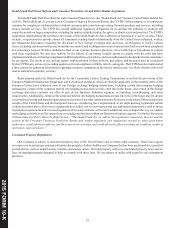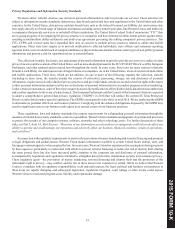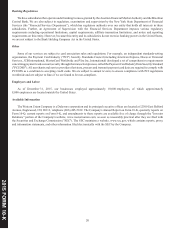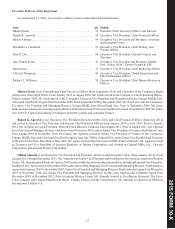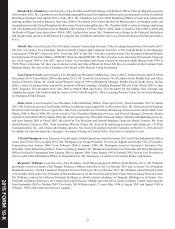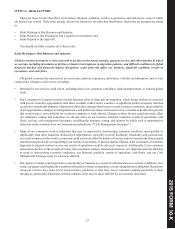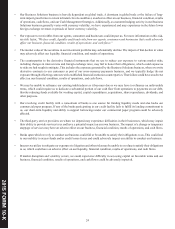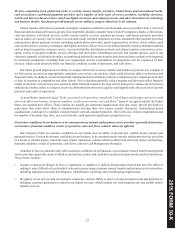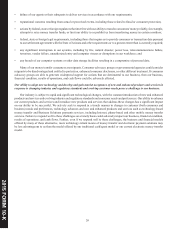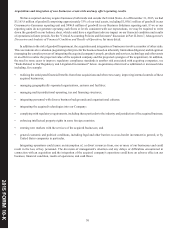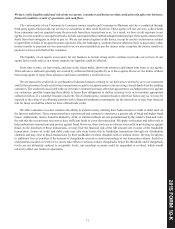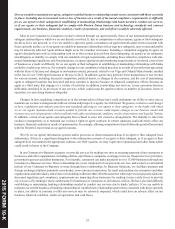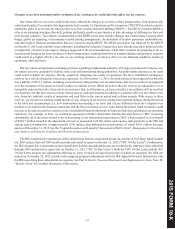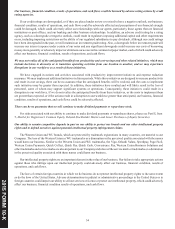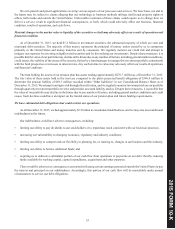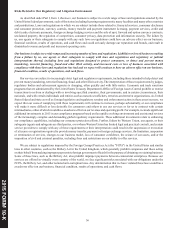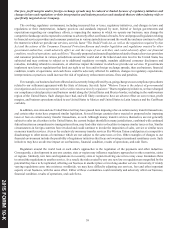Western Union 2015 Annual Report Download - page 130
Download and view the complete annual report
Please find page 130 of the 2015 Western Union annual report below. You can navigate through the pages in the report by either clicking on the pages listed below, or by using the keyword search tool below to find specific information within the annual report.
28
A substantial portion of our revenue is generated outside of the United States. Repatriating foreign earnings to the United
States would, in many cases, result in significant tax obligations because most of these earnings have been taxed at relatively
low foreign tax rates compared to our combined federal and state tax rate in the United States. We utilize a variety of planning
and financial strategies to help ensure that our worldwide cash is available where needed, including decisions related to the
amounts, timing, and manner by which cash is repatriated or otherwise made available from our international subsidiaries.
Changes in the amounts, timing, and manner by which cash is repatriated (or deemed repatriated) or otherwise made available
from our international subsidiaries, including changes arising from new legal or tax rules, disagreements with legal or tax
authorities concerning existing rules that are ultimately resolved in their favor, or changes in our operations or business, could
result in material adverse effects on our financial condition, results of operations, and cash flows including our ability to pay
future dividends or make share repurchases. For further discussion regarding the risk that our future effective tax rates could be
adversely impacted by changes in tax laws, both domestically and internationally, see risk factor "Changes in tax laws and
unfavorable resolution of tax contingencies could adversely affect our tax expense" below.
Money transfers and payments to, from, within, or between countries may be limited or prohibited by law. At times in the
past, we have been required to cease operations in particular countries due to political uncertainties or government restrictions
imposed by foreign governments or the United States. Occasionally agents or their subagents have been required by their
regulators to cease offering our services, see risk factor "Regulatory initiatives and changes in laws, regulations and industry
practices and standards affecting us, our agents or their subagents, or the banks with which we or our agents maintain bank
accounts needed to provide our services could require changes in our business model and increase our costs of operations,
which could adversely affect our financial condition, results of operations, and liquidity" below. Additionally, economic or
political instability or natural disasters may make money transfers to, from, within, or between particular countries difficult or
impossible, such as when banks are closed, when currency devaluation makes exchange rates difficult to manage or when natural
disasters or civil unrest makes access to agent locations unsafe. These risks could negatively impact our ability to offer our
services, to make payments to or receive payments from international agents or our subsidiaries or our ability to recoup funds
that have been advanced to international agents or are held by our subsidiaries, and as a result could adversely affect our business,
financial condition, results of operations, and cash flows. In addition, the general state of telecommunications and infrastructure
in some lesser developed countries, including countries where we have a large number of transactions, creates operational risks
for us and our agents that generally are not present in our operations in the United States and other more developed countries.
Many of our agents outside the United States are post offices, which are usually owned and operated by national governments.
These governments may decide to change the terms under which they allow post offices to offer remittances and other financial
services. For example, governments may decide to separate financial service operations from postal operations, or mandate the
creation or privatization of a "post bank," which could result in the loss of agent locations, or they may require multiple service
providers in their network. These changes could have an adverse effect on our ability to distribute or offer our services in countries
that are material to our business.
201 FORM 10-K
5


